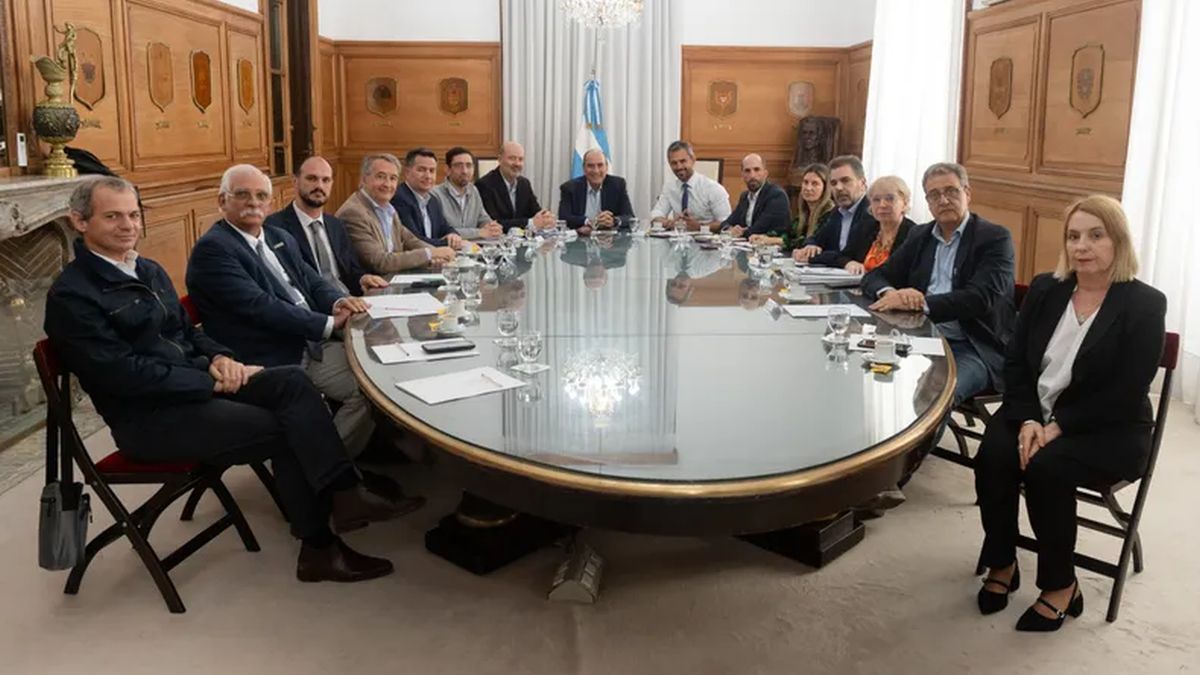He Government of Javier Milei accelerates negotiations with deputies allies in the treatment of Budget 2025 and the Leaflitter law, in order to guarantee the votes in the Congress to achieve approval of both projects.
This Monday, the Chief of Staff, Guillermo Francosand the Minister of Deregulation and Transformation of the State, Federico Sturzeneggermet with legislators from the lower house of dialogue blocs to outline the parliamentary strategy.
The meeting, which took place in the Hall of Shields of Casa Rosada, was attended by the Vice Chief of the Executive Cabinet, Jose Rolandi; the president of the Chamber of Deputies, Martin Menem; and the secretary of State Transformation and Public Function, Maximiliano Fariña.
As for the deputies, the presidents of the La Libertad Avanza and PRO blocs were present, Gabriel Bornoroni and Cristian Ritondorespectively, and the following legislators: Nicolás Mayoraz (LLA), Santiago Santurio (LLA), Carlos Zapata (LLA), Silvia Lospennato (PRO), Silvana Giudici (PRO), Eduardo Falcone (MID) and María Cecilia Ibañez (MID). The economist also participated in the meeting Lucas Llach.
The ruling party aspires to approve in the last quarter of the year the Budget 2025 which will continue to be debated on Tuesday in committee in an informative meeting in which the Minister of Security will present Patricia Bullrichand the head of Anses, Mariano de las Heros.
The Government refines its strategy to garner votes ahead of the debate on Budget 2025 and the Hojarasca law
For next year the Government hopes that the economy grow 5%the inflation slows to 18.3%that the dollar official progress at a pace similar to the prices standing at $1,207 in December, a primary surplus of 1.3% of GDP and balance in the financial result of the Treasury. These are the main macroeconomic data contained in the budget project that the Executive Branch submitted to Congress.
In addition, the Hojarasca law is seeking approval, where it is proposed to eliminate 70 laws that the Government considers “obsolete or in disuse.” The text maintains “the need for eliminate all legislation that is not in keeping with the times either due to its obsolete, useless nature, or because it has been superseded by later regulations, because it is legislation on issues of little relevance or useless procedures that generate or increase costs for citizens.”
Among the laws that the government will suppress, the 18,832 of 1969, promulgated during the dictatorship of Juan Carlos Onganía, that “created a fund to control the production of newsprint and condition the written press. Likewise, he proposes eliminating the law 14,034 of the government of Juan Domingo Peron which imposes penalties for Argentines who “by any means promote the application of political or economic sanctions against the Argentine State.”
The Hojarasca law also proposes eliminating the law 20,120 of the government of Alejandro Lanusse which “enables the State to prohibit private meetings between citizens” and repeals 19,787 of 1972, which “restricts the free choice of musical themes in radio programming.”
Furthermore, it promotes the suppression of two laws of the government of María Estela Martínez de Perón: the law 20,802 that “prevents free movement throughout the country”, law 20,959 that “repeals the free parking permit for legislators throughout the country” and the law 20,983 that “forces certain industries to compulsively disseminate topics of interest to the State.”
It is also proposed the elimination of two laws of the de facto government of Reynaldo Bignone. On the one hand, the law 22,875 which “allows the State to demand that private companies relocate their productive activities” and rule 22,964 of 1983, which “enables the forced confinement of leprosy patients.”
Source: Ambito




